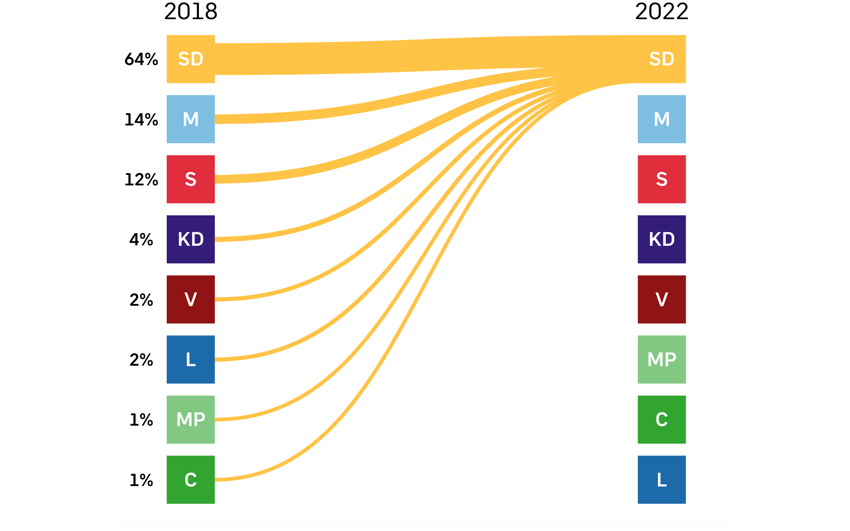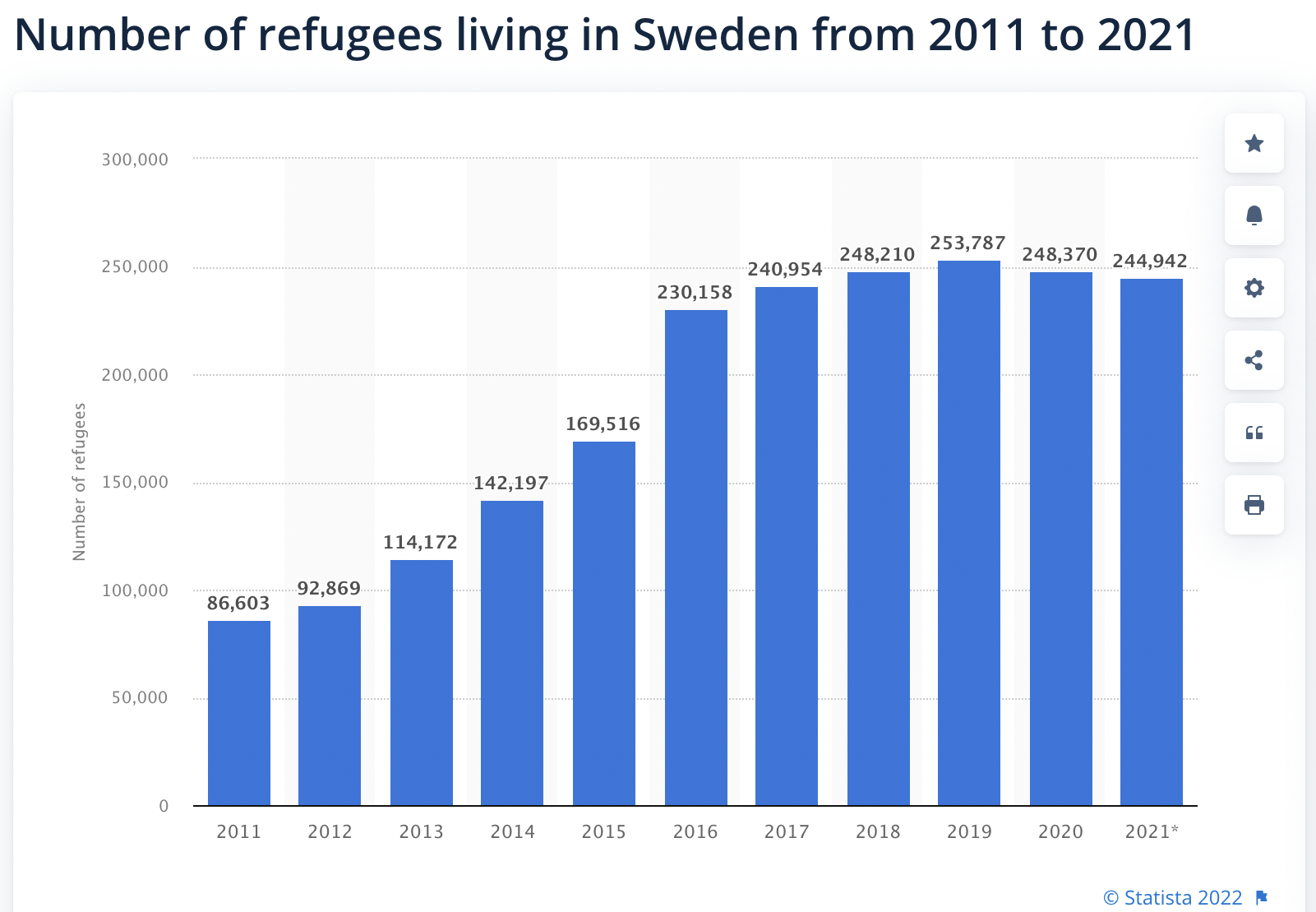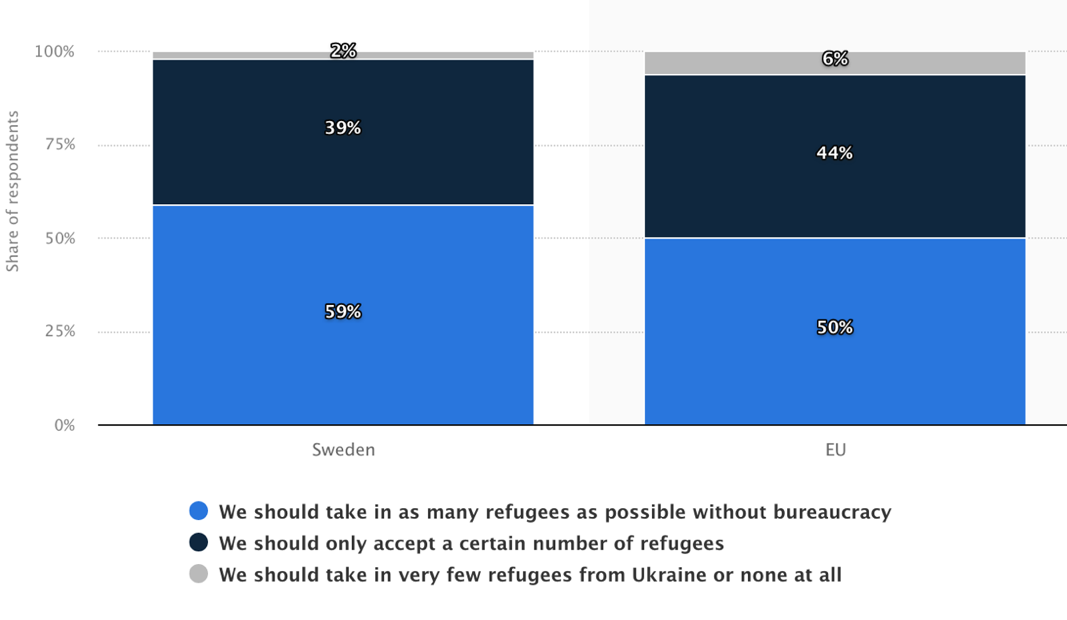Shocking Election Results
"Sweden is completely divided and in my half people are in shock," Expressen columnist Jonas Gardell said on September 12, after the parliamentary elections. The liberal public had something to be confused about: in the elections to the Swedish parliament, more than 20% of the population voted for the Swedish Democrats (Sverigedemokraterna, or SD), a right-wing populist party with a militant anti-immigration program.
In 2014, when Swedish Prime Minister Stefan Löfven announced that his country would accept all Syrians who made it to its borders, the SD was already the third largest faction in parliament. Today it is in second place, and the likely Prime Minister Ulf Kristersson (Moderates), who previously rejected cooperation with the SD, says that "it is undemocratic not to let into the government those who the people want to see there." According to a Valu poll , the SD electorate has grown at the expense of other parties, from the Moderates (Moderata samlingspartiet) and the Liberals (Liberalerna, L) to former communists from the Left Party (Vänsterpartiet, L) and the Greens (Miljöpartiet de gröna , MP).

As Swedish independent political commentator Malcolm Dixelius explained to The Insider, the rise of the SD does not mean that Swedes no longer want to accept refugees (there has always been a xenophobic minority in the country, and the Swedish Democrats only consolidated it), but that voters want to change the migration pattern. legislation – this is probably what will now be done.
Roots of the migration crisis
The Swedish migration crisis erupted back in 2010, when the number of asylum seekers grew by a quarter. Not everyone was allowed to stay in the country, but humane Swedish law (later repealed) allowed a person who was denied refugee status to reapply after four years. Therefore, many "refuseniks" went underground – "underground", as they say in Sweden, in order to then again appear before the officials of the Migration Board.
In 2014, the number of asylum seekers jumped by 50%, and doubled the following year. Centers for temporary resettlement of refugees were created throughout the country in order to evenly distribute the load. Nobody asked the opinion of local authorities, and they often did not have enough resources to receive such a large number of people.
The migration services dealt primarily with the Syrians, so the appeals of people from Afghanistan, Eritrea, Iraq, Somalia and other countries were delayed for months and even years. All this time, applicants had neither the right to work nor the opportunity to study and learn the language (only their children went to school and had health insurance). By the time the lucky ones received a “positive”, many of them were already used to sitting on the neck of the state. Tensions among the refugees escalated due to the fear of deportation. In 2015, an Eritrean immigrant walked into an IKEA store in Erikslund after being rejected, took a kitchen knife from a shelf, and stabbed two customers to death.
The locals had the impression that refugees were living on everything ready, because of them inflation and taxes were growing in the country, and Swedish old people had to survive on a modest pension (in 2014, the minimum net pension in Sweden was about 3 thousand Swedish crowns – less than 300 Euro). In the provinces, especially in the so-called depressed regions, support for the Swedish Democrats is extremely strong.

In addition to economic factors, the Swedes are also concerned about crime. The crime rate in the country is low, and despite the fact that the proportion of migrants in the country was constantly growing before the coronavirus pandemic, crime in the country was decreasing . However, due to the fact that, on average, the socio-economic situation of migrants is worse than that of the indigenous population, a high (by local standards) crime rate is observed mainly in migrant areas, which causes dissatisfaction among the Swedes. Among the visitors suspected of various offenses, the majority are from West Asia, Central Asia and various regions of Africa.
The "Swedish Democrats" also appeal to values that are hostile to the rule of law, mentioning, among other things, supporters of Sharia who do not want to integrate. However, there can hardly be a significant number of such people, since Muslims in general in Sweden are only 2.3% and most of them are not radical.
Finally, the Swedish Democrats like to raise the issue of how migrants cheat the system in order to obtain status. Previously, Sweden did not require any documents from arrivals, and it was not difficult to buy a Syrian passport in Turkey, as Israeli journalist Zvi Ihezkieli showed in the documentary series Allah is Islam (2012). In order to somehow control this flow, in 2016, for the first time since 1954, border controls were established between Sweden and Denmark. However, it was possible to travel back from Sweden freely. The European system turned out to be “leaky”: an immigrant who was refused in one country moved to another and applied for asylum as if for the first time, although this is prohibited by law. The "Swedish Democrats" demanded that everyone who received refugee status by fraud be deported. Like, you can’t trust applicants who, after the first refusal, report a conversion to Christianity or an alternative sexual orientation in order to obtain asylum. Such cases were not massive, but attracted a lot of attention.
"Sweden is full." But not for Ukrainians
The day after Russia's invasion of Ukraine, the Swedish Democrats wrote on their official website: "Sweden is overcrowded!" Even the leftist government has recognized that the new wave of migration is a serious challenge. Already in April, up to four thousand people a day began to arrive in Sweden from Ukraine. Everything seemed to be heading towards an explosion of discontent. However, in September 2022, the majority of Swedish residents agree that their country should accept as many Ukrainian refugees as possible, and only a tiny 2% spoke in favor of limiting immigration. For comparison: in 2018, 52% of Swedes demanded fewer immigrants, 33% were in favor of existing norms, and only 14% were in favor of increasing them (a Pew Research poll).

Even the Swedish Democrats suddenly changed their nationalist rhetoric. “The country must make room for women and children (coming from Ukraine),” party spokesman Ludwig Aspling announced. In the final resolution of the party conference, Ukrainian refugees are called "especially deserving of protection." Unheard of: staunch opponents of immigration for the first time said something good about refugees and approved of their admission!
Immigrants from Ukraine are accepted by almost all European countries, but their status is determined by the Mass Protection Directive , according to the resolution of the European Parliament of March 1, 2022. This status is granted for a year with the option of renewal and allows displaced persons to receive EU residence permits, the right to work, housing, social security and medical care. The "Directive" remains temporary and does not allow settling in the host country. The implication is that when the danger is over, the refugees will return home. In other words, in Sweden, Ukrainians are perceived as neighbors in need of help, and not future fellow citizens. Conditions for refugees in Sweden are quite spartan. For example, those who live in housing with meals included receive approximately $2 per day per adult and $1 per child, while those who live without meals receive approximately $6 per day. It is absolutely impossible to live on this money alone in Sweden, so many refugees who do not have their own income return to Ukraine or move to countries with more realistic chances of finding work. As a result, there were fewer Ukrainian immigrants in Sweden than the Swedish authorities predicted. Of the 7 million Ukrainian refugees in Europe, only 45,000 ended up in Sweden.
Refugees of the previous wave also received little money at the beginning. But they, unlike the Ukrainians, could count on a new status that provided them with the full and lifelong care of a country generous to its citizens. Ukrainians have no such hopes. Mostly those who have relatives or friends in Sweden come here. Approximately three-quarters of immigrants from Ukraine who arrived in the first months of the war solved their housing problems on their own.
For ordinary Swedes, it is also important that Ukrainian refugees are mostly women and children (more young men came from Syria and Afghanistan, which unpleasantly surprised the local population, although this is quite understandable from the point of view of logistics) and they go to the country legally, to while a significant proportion of immigrants from Africa, Asia and the Middle East came here illegally.
The consensus of the Swedish society in relation to immigrants from Ukraine is determined to a large extent by solidarity and rejection of Putin's aggression. Among the Swedes, as well as in the Western world in general, there is a strong belief that the Ukrainians are fighting on their own soil for the whole of Europe. For Sweden, these are not empty words – Russian aggression is seriously feared here. It is no coincidence that the country joins NATO, abandoning more than two hundred years of neutrality. Unlike the distant and obscure events in Syria, Afghanistan, Somalia, Eritrea and other countries, the war between Russia and Ukraine is literally a war on the threshold of the Swedish house.
The Swedish Democrats have their own reason for showing sympathy for Ukrainian refugees. The party has been criticized more than once for its ties to Moscow, and today it has to distance itself from old partners. Recently, one of its activists, Royer Richthoff, was expelled from the SD: on his Facebook page, he posted a video thanking Russia for "liberating the Ukrainian people from genocide and ethnic cleansing." At another time, colleagues might not have paid attention to such "trifles", but the war presents its own account. The "Swedish Democrats" are resigned to being called radicals and populists, but they do not want to be considered Putinists, because there is no more shameful label in the world.


